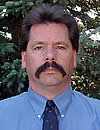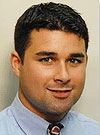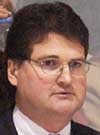College hockey has, for the past few years, been in the land of riches.
Everything began in 2000 when Boston University goaltender Rick DiPietro was chosen as the number-one overall pick in the NHL Entry Draft. Minutes after DiPietro was chosen, Wisconsin’s Dany Heatley made the daily double when he was picked second.
Since that time, college hockey has been on a record-setting pace, at least as far as the draft is concerned.
In 2003, college hockey saw seven current and two incoming players walk to the podium during the first round of a draft that NHL scouts called one of the deepest ever. That remains the most college players ever taken in the opening round.
Last year a total of seven college or college-bound players were first-rounders, including Blake Wheeler, the highest among those chosen. Wheeler still had one year of high school remaining and will finally join Minnesota this fall.
But five years after the DiPietro-Heatley double, college hockey may finally be about to face some reality.
A quick look at the National Hockey League Central Scouting Service (CSS) end-of-season rankings shows that there’s a good chance that this year’s first round will come and go without a single current collegiate player selected.
Boston College’s Dan Bertram is the highest-ranked college forward or defenseman at 36. Vermont’s Joe Fallon is the highest-ranked goaltender at 15.
Does that mean that college fans shouldn’t bother tuning in (which might not be a problem, as no U.S. network will be televising the draft)? Not necessarily.
Those interested in the future of the college game will find plenty to cheer about at Saturday’s draft.
That starts with Michigan recruit Jack Johnson. A 6-foot-1 defenseman from Faribault, Minn., Johnson led all blueliners on the U.S. Under-18 team last season with 31 points (12 goals, 19 assists) in 38 games.
Johnson is a solid two-way defenseman with an excellent physical presence on the ice. Last season his 143 penalty minutes were tops on Team USA, something that will help add a solid physical presence to the Michigan blueline in October.
It’s hard to gauge where Johnson will end up. Some mock drafts list him as high as third. Other put him toward the bottom of the top ten. Wherever he does end up landing, it’s likely to be the highest among college and college-bound players in a draft that, for the first time in a long time, should be dominated by Canadian junior hockey.
Beyond Johnson, Central Scouting ranks only four other players with serious first-round potential. Jack Skille, who will attend Wisconsin in the fall; Ryan Stoa, who is on his way to Minnesota this year; and Brian Lee, who will enroll at North Dakota this fall, all landed midway through the round in the CSS rankings, finishing 11, 13 and 15 respectively.
Soon-to-be Michigan State Spartan Justin Abdelkader was ranked 25th by CSS, rounding out the first-round potential.
As for current players, after Bertram at 36th, Cornell’s Sasha Pokulok sits 39th and Minnesota’s Nate Hagemo is 58th.
If you’re looking for some college hockey darkhorses, Paul Stastny, son of NHL legend Peter and a member of the defending national champion Denver Pioneers, is ranked 74th but should see his market value rise. The same should hold true for Michigan’s T.J. Hensick, who sits 78th but could be chosen in the first two rounds by an NHL team that favors college hockey players such as Edmonton or New Jersey.
This year’s draft will see some minor adjustments from years past. That begins with the selection order.
Due to the cancellation of the NHL season last year, each team was given a weighted number of ping-pong balls in the league’s draft lottery. The entire draft order was determined by the draw and Pittsburgh won the first selection. That is a lock to be spent on Sidney Crosby, out of the Quebec Major Junior Hockey League. Crosby is thought to be the best available draft choice since the man who will draft Crosby, Mario Lemieux.
At the end of each round, the draft order will reverse, so the team that picks 30th in a round will pick first in the next round.
In addition, the draft, which was only scheduled two weeks ago, will be shortened to seven rounds and one day, down from the nine-round, two-day draft the past three years.
All tolled, 105 current or incoming college players were ranked by the NHL CSS.


